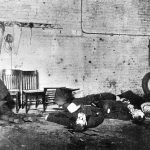
A bit of a dirty word since 1938 but it shouldn’t be. There is enough appeasement going on now over the disgusting situation in Syria to fill the Golden Bowl with appeasers eager to keep Assad Junior happy. It is all rather puzzling. With one Bush, America went with its cautious allies to war against Iraq because Saddam invaded Kuwait. Firepower won, of course, but Saddam’s government remained! Then Bush Jr. went to war with Iraq with equally cautious allies, beat him up, and permitted the locals to lynch Saddam in a particularly horrible way. Now in Syria the Assad boy kills hundreds of fellow citizens every day, even using poison gas to do it, and the world’s committees sit expensively around asking themselves what to do.
Appeasement is the policy of settling disputes by peaceful means and compromise rather than tearing into a war. That seems perfectly all right to me, but the word appeasement is associated in a pejorative sense with Mr. Neville Chamberlain flapping bits of paper on his return from having coffee and biscuits with Adolf Hitler in Munich, Europe fiddling about while the Balkans burned, the Czechoslovakian Crisis of 1938 etc., and it is not surprising. The word’s origins go back to the Treaty of Versailles in 1919. Most British thinkers and movers thought that Germany had been badly treated (it had, but conversely many also opined it had got what had been coming), as the bill for reparations was too high and anyway unpayable. They also thought that the principle of self-determination had not been applied in the Treaty to areas where there were German majorities, such as Austria and the Sudetenland (q.v.).
There was readiness, therefore, in Britain and other countries to confront genuine Germanic grievances (there were many), strengthened by a desire to avoid more ghastly losses of life in another armed conflict on the same scale, or worse, as the Great War. Britain, in particular, had borne the brunt of the fighting during four years, was exhausted, had lost the cream of its manhood (average life expectancy in the trenches had been thirty hours), was in economic decline and saw the Empire threatened. The United States had stirred itself in 1917, thrown off the Monroe Doctrine (q.v.), and joined the Allies. France and Belgium were on their last gasp. Germany had not enough industry to earn enough cash to pay for the reparations demanded by Versailles, and would shortly enter the million-mark-loaf-of-bread period. Only the Neutrals had prospered, and there were exceptions: Spain entered the 20s even poorer than she had been before the War, in which she was neutral.
Another strong incitement to appeasement in Britain was her commitment to defence of the huge and unwieldy Empire. There was also the threat from members of the Anti-Comintern Pact (1936). Military Chiefs of Staff said, “we cannot foresee the time when our defence forces will be strong enough to safeguard our trade, territory and vital interests against Germany, Italy and Japan at the same time.” Japan had taken control of Manchuria in 1931 with not a squeak from the famous League of Nations, or anyone else for that matter. With the Anglo-German Naval Agreement in 1935 (q.v.) Britain actually agreed to Germany’s ignoring the limitations imposed by Versailles on the size of the German Navy.
Then Mussolini invaded Ethiopia (or Abyssinia) and Britain tried appeasement, rapidly withdrawn when the secret Hoare-Laval Pact was leaked and a public outcry ensued. A year later Germany re-occupied the Rhineland (how, economically, did they do it?) and Britain and France remained like Brer Rabbit – they did and said nuttin’.
Chamberlain became Prime Minister in 1937 (while Winston Churchill chewed on his unlit cigar with frustration) and decided that appeasement was the best policy, as it was well enough embedded. Neville Chamberlain never believed that either France or the United States would act against Hitler, and said so. He also distrusted Russia (as well he might!) and told friends he thought that Hitler was a nice and rational man with whom he could talk. If this nice rational man organised Anschluss with Austria this was merely a matter of German-speakers uniting with each other, and should not be opposed. When the previously mentioned Czechoslovakian Crisis developed in 1938 Chamberlain did not think Britain should go to war because of ‘a quarrel in a far-away country’. He also pointed out that if the majority of the population of the Sudetenland were German, then it should be part of Germany. Having said all this, he was acclaimed by the people, though not necessarily by the suspicious Press, as a hero.
Appeasement, British people said to each other in the tube or on the buses going to work, had worked and there would be no more war. The Great War had been the ‘war which would end all wars’.
In March, 1939 Hitler occupied Czechoslovakia, and his expansionist plans became clear. Appeasement ended and Britain joined France in agreeing to support Poland should she be attacked. Half-hearted attempts were made in Moscow to persuade Russia to co-operate against Germany, and Stalin’s answer was to sign the Nazi-Soviet Pact in August of 1939 (q.v.). Britain plunged further into the mire by signing agreements for defence with Romania and Greece. With appeasement ended, the whole system turned upside down, and preparations for inevitable world war were made. It was only twenty-one years after the ‘end’ of the Great War.
The effects of appeasement were in reverse of those poor disillusioned Chamberlain had intended. Appeasement had convinced Hitler that neither Britain nor France would go to war as he set about invading every country in sight. The huge and repellent conflagration which started in 1939 was one which not one of the great powers (except Germany) wanted, especially America, which held out against war until December, 1941.










Leave A Comment